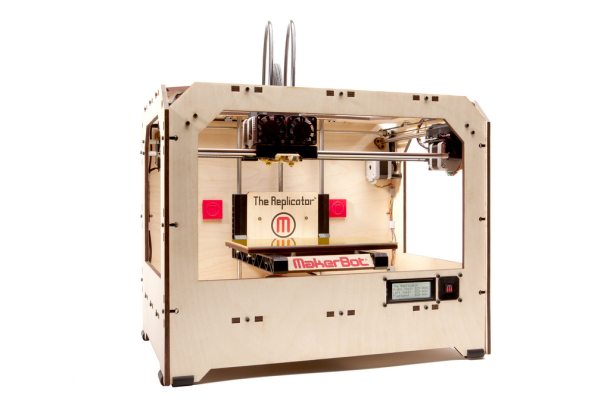
One of the suspects in the DMCA claim. A MakerBot Replicator. Courtesy of MakerBot.
Latest News
June 5, 2012
I really wanted to name this post something snappy. Attack of the Clones, maybe. For the sanity of my editor, I resisted (also, this is part three, not two). For the whole story on the pending collision of 3D printing and intellecutal property, you can check out part one and part two of my earlier forays into this subject. The clone angle isn’t all flippancy, either. The rise of 3D printers will give people just that sort of capability, albeit with objects rather than humans.
It was bound to happen sooner rather than later. I’ve been trying to keep my ears open for the sounds of the opening shots and I’ve heard one. Miniatures company Games Workshop has issued what is probably one of the first cease-and-desist Digital Millennium Copyright Act (DMCA) notifications based on a CAD design and a 3D printed object.
Here’s the story: A fellow named Thomas Valenty bought a MakerBot system and, naturally enough, started looking around for objects to print. Valenty’s brother had some of Games Workshop’s miniatures, so Valenty decided to create a CAD file of a tank and a mechanical walker (if you know Star Wars, think AT-ST) in the style of the miniatures.
After putting about a week of effort into creating the CAD file, Valenty uploaded the designs to Thingiverse. That decision resulted in the DMCA claim and in Thingiverse taking down the files. In this particular case, that might be the end of the dispute. Maybe. Assuming the designs don’t show up on pirate websites that giggle at DMCA or aren’t just passed around on torrents.
Leaving aside shady methods of getting designs, if Valenty had decided to fight the DMCA, he might have gotten some traction. Intellectual property (IP) isn’t as clear as all that. Also take note that Games Workshop (like many other companies) has a fairly litigious history.
This all sounds familiar to me. I remember when the RIAA went all out and decided to start suing individual users en masse for potential piracy. That plan backfired spectacularly, as have other such shock-and-awe tactics as soon as people lawyer up or get the media involved. The paradigm has shifted and companies need to start thinking about how to adapt.
Below you’ll find a video that shows a 3D printed tank that was created using the DMCA disputed files.
Source: Wired
Subscribe to our FREE magazine, FREE email newsletters or both!
Latest News
About the Author
John NewmanJohn Newman is a Digital Engineering contributor who focuses on 3D printing. Contact him via [email protected] and read his posts on Rapid Ready Technology.
Follow DE






